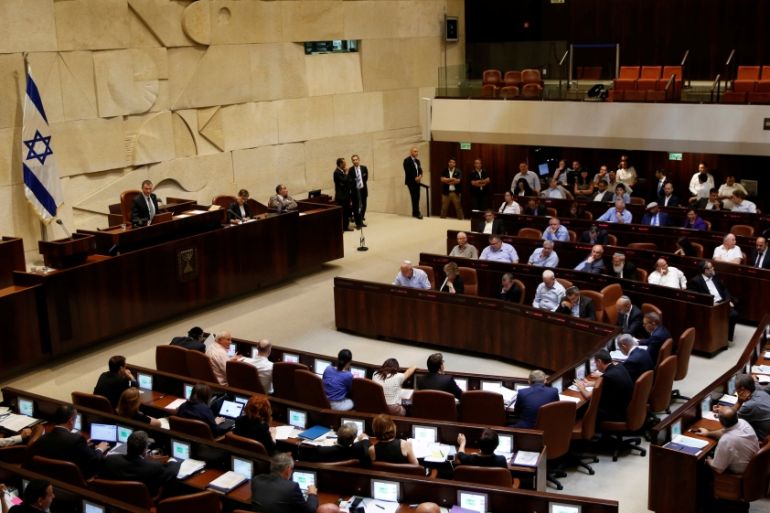Critics call Israel’s nation-state law ‘provocative and racist’
Opponents say the legislation will have a far-reaching impact on social dynamics in Israel and on the future of peace.

Critics condemned Israel’s new “nation-state” law saying it delivers a serious blow to the country because it puts Jewish identity ahead of the nation’s democratic principles while making Arab citizens “permanent foreigners”.
The law will initiate a long-term process that will chip away at the rights and status of Muslim and Christian Arab citizens of Israel, according to opponents.
Keep reading
list of 4 itemsIn the jungle with Myanmar’s rebels as thousands of new recruits join
‘Old friend’ Putin and China’s Xi strengthen strategic ties at summit
Russia-Ukraine war: List of key events, day 812
Adopted with 62 votes for and 55 against on Thursday, the legislation will have a far-reaching impact on social dynamics inside Israel and on the future of peace with the Palestinians and the two-state solution, they say.
‘Historical homeland’
The law states the “land of Israel” – a reference to all of historical Palestine – “is the historical homeland of the Jewish people”, marginalising the existence of the Arab-Palestinian people inside the country who are citizens, as well as those in the occupied territories who are not.
It also stripped the Arabic language of its official status, giving it instead a vague “special status” designation. Hebrew is now the only official language in Israel.
Excluding Arab Christians and Muslim citizens, the law said: “The state of Israel is the national home of the Jewish people, in which it fulfils its natural, cultural, religious and historical right to self-determination.”
![Jamal Zahalka [Loay Abu Haykel/Reuters]](/wp-content/uploads/2018/06/27f7b91d55af4fa8be39d4ee9cbb4d8f_18.jpeg)
Jamal Zahalka, an Arab member of the Knesset who voted against the law, told Al Jazeera it establishes a new set of rules that will legitimise anti-Arab racism and increase the building of illegal settlements in the occupied Palestinian territories.
“The law will now give illegal Israeli settlements legal backing and officially get rid of any possibility of establishing a Palestinian state in the occupied territories,” Zahalka said.
Palestinians have long demanded to have their own state in the West Bank, Gaza, and East Jerusalem, which were occupied during the 1967 war.
“The law will also back discrimination against Arab citizens who can be legally prevented from residing in Jewish-only areas,” Zahalka added.
‘Distressing’
Barry Trachtenberg, presidential chair of Jewish history at Wake Forest University in the US, told Al Jazeera the law is reminiscent of how Jews were treated in the 20th century.
“As a historian of European Jewry, I have to say that I find this announcement to be distressing in the extreme. It wasn’t that long ago that Jews were on the other side of such policies,” he said.
In the first decades of the 20th century, Trachtenberg noted, Jews across Europe demanded to be a legally protected minority in the countries they resided in. The desire to chart their own history with their own language and institutions was widely shared across a wide spectrum of Jewish people, including many Zionists.
![Barry Trachtenberg [Al Jazeera]](/wp-content/uploads/2018/05/9bbf16091b5443b78b7e0cd4327dfcdc_18.jpeg)
Most European countries ignored their wishes and continued to view Jews as an unwanted people.
“Now Israel has embraced its own ‘nation-state’ law, which further marginalises the existence of the 20 percent of Israeli citizens who are Palestinian Arabs,” said Trachtenberg.
‘Provocative’
Israeli intellectual and author Yossi Klein Halevi told Al Jazeera the new law is “an unnecessarily provocative statement that will undermine the self-confidence of the Arab citizens who now feel that their place in the state of Israel is still uncertain”.
“This new law is a clumsy act that takes us several psychological steps back. While it might not have practical consequences, psychologically it is deeply damaging to the Arab minority,” said Halevi, author of the best-selling book, Letters to My Palestinian Neighbor.
While non-Jewish citizens of Israel expressed alarm over the law, ordinary Jewish Israelis won’t see significant changes in their everyday lives, Israeli journalist Seth Frantzman told Al Jazeera.
“In Israel, you will not see people excited or not excited because, for Jewish Israelis, the new law enshrines what already exists,” Frantzman said.
“The law did not bring anything new because the same situation already exists in Israel since the founding of the state.”
There cannot be equality in a state where one people is legally and systematically elevated above the other.
Michel Sabbah, the former Archbishop and Latin Patriarch of Jerusalem, told Al Jazeera the “racist” law did not surprise him. He said he suspects it is the first step in a bigger plan to establish more such laws and practices “against Arab citizens”.
The law was passed because the “current leaders of Israel are extremists”, said Sabbah, adding he hopes at one point new Israeli leaders will change the law to one that “treats all citizens of the state equally”.
But for Trachtenberg, history shows where such laws lead: “to segregation, racism, oppression, mass incarceration, and ethnic cleansing”.
“There cannot be equality in a state where one people is legally and systematically elevated above the other,” he said.
Follow Ali Younes on Twitter: @ali_reports